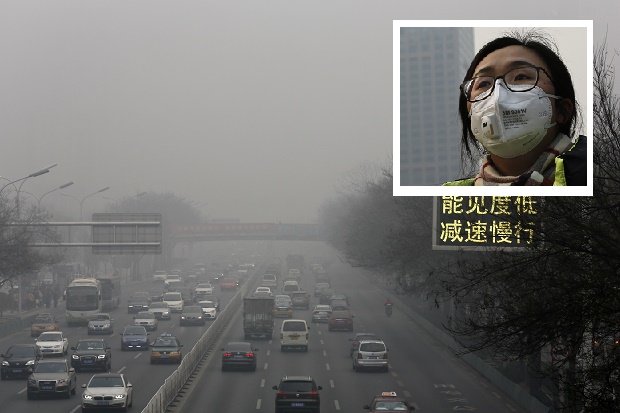Pollution chokes Beijing; city issues 1st smog red alert

A woman (inset) walks through Beijing wearing a mask as vehicles drive along a road with a traffic sign reading “Visibility low, slowdown the speed” on Nov. 30, 2015. Beijing on Sunday, Nov. 29 issued its highest smog alert of the year following air pollution in capital city reached hazardous levels as smog engulfed large parts of the country despite efforts to clean up the foul air. AP
BEIJING, China — Schools closed and rush-hour roads were much quieter than normal as Beijing’s first-ever red alert for smog took effect Tuesday, closing many factories and invoking restrictions to keep half the city’s vehicles off the roads.
The alert in effect through Thursday — the most serious warning on a four-tier system adopted a little over two years ago — means authorities have forecast more than three consecutive days of severe smog.
A grey soupy haze subsumed Beijing’s unique landmarks, and convenience stores did brisker-than-usual business selling air-filtering masks as residents sought to spend as little time outdoors as possible.
“You have to do whatever you can to protect yourself,” Beijing resident Li Huiwen said while stopping at a market. “Even when wearing the mask, I feel uncomfortable and don’t have any energy.”
Under the alert, schools were advised to voluntarily close unless they had good air filtration systems. However, Beijing’s education commission later issued a separate order for all schools to close through Thursday.
Article continues after this advertisementAn online notice from the Beijing Municipal Environmental Protection Bureau on Monday said it issued the alert to “protect public health and reduce levels of heavy air pollution.”
Article continues after this advertisementBeijing hotel staffer Fan Jinglong said the smog forecast was “really worrisome.”
“We have no choice but to step up preventative measures like wearing a mask outdoors at all times,” he said.
Readings of PM2.5 particles climbed toward 300 micrograms per cubic meter on Tuesday and are expected to continue rising before the air begins to improve with the arrival of a cold front on Thursday. The World Health Organization designates the safe level for the tiny, poisonous particles at 25.
Along with limiting cars to driving every other day depending on the last number of their license plate, a raft of other restrictions will seek to reduce the amount of dust and other particulate matter in the city of 22.5 million people. Officials said extra subway trains and buses would be added to handle the additional strain on public transport.
It’s the second time this month that notoriously polluted Beijing has experienced a prolonged bout of smog, sending PM2.5 levels in the suburbs as high as 976 micrograms. Beijing was also shrouded in persistent smog for most of November, when power demand soared due to unusually cold weather.
While pollution in the capital improved in the first 10 months of the year compared with the same period last year, heavy smog that can be seen from outer space regularly forces Beijing schools to suspend outdoor activities and can even prompt highway closures because of reduced visibility.
“It is a sharp warning to us that we may have too much development at the price of environment and it is time for us to seriously deal with air pollution,” said Fan, the hotel employee.
There previously have been stretches of severe smog in Beijing that lasted more than three days. However, those had initially been forecast to last three days or less, so they did not trigger a red alert. The alert requires a forecast of more than 72 straight hours with PM2.5 levels of 200 micrograms per cubic meter or more.
Polluted air throughout broad swaths of China has had severe health effects. A study led by atmospheric chemist Jos Lelieveld of Germany’s Max Planck Institute and published this year in Nature magazine estimated that 1.4 million people each year die prematurely because of pollution in China.
Most of the pollution is blamed on coal-fired power plants, along with vehicle emissions and construction and factory work. China, the world’s biggest carbon emitter, plans to upgrade coal power plants over the next five years to tackle the problem, and says its emissions will peak by around 2030 before starting to decline.
While emissions standards have been tightened and heavy investments made in solar, wind and other renewable energy, China still depends on coal for more than 60 percent of its power.